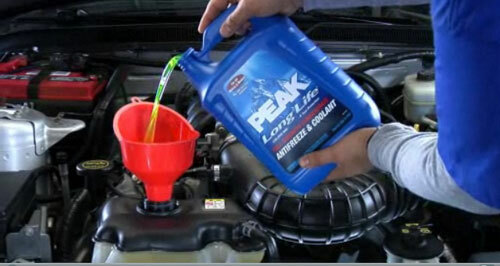A fairly large number of modern motorists do not attach importance to what kind of composition is used to cool the engine of their beloved car. There are still people who think lightly: all cooling fluids( OCs) work approximately the same way.

Meanwhile, the choice of coolant for the motor - a very important task, because from the correct solution depends not only the trouble-free operation of the engine, but also its economy, as well as durability. Cooling liquids presented in the market of our country can be divided into two main groups: antifreeze and antifreeze. What is the difference between antifreeze antifreeze and what kind of variations of these fluids are on the market - we'll talk about this in this article.
What is OLC?
The basis of any coolant is water and ethylene glycol( very rarely propylene glycol can be used).Addition of alcohol in a volume of 50% -60% allows to increase the temperature of boiling and lower the freezing point of the solution. However, for a full-fledged OZH these components are not enough.
A number of special additives are needed to protect parts and the engine housing against corrosion, and also improve the functionality of the coolant. It is in the composition of these very additives, or additives, which is a more correct name, and the difference between the coolants produced by different manufacturers lies. Tosol and antifreeze: what is the difference?
Tosol is a coolant containing corrosion inhibitors of salts of inorganic acids:
- nitrite;
- nitrates;
- silicates;
- borates;
- amines;
- phosphates.
Technology of production of antifreeze is considered obsolete, in developed countries such coolants are not produced.
More progressive development is antifreeze: it is a cooling liquid, the additive complex of which is formed by salts of organic acids, commonly referred to as "carbonates".It is because of the availability of additives to this group that antifreezes are often called carboxylate coolants.

In addition to these differences, there is one more, which immediately indicates even a novice motorist. It is a question of that antifreezes and tosols, issued by various trade marks, have a different color. Many, in perplexity ask a question: what, for example, differs blue antifreeze from red, and than - green antifreeze from blue?
We declare with all responsibility: the coloration of the coolant does not affect its performance in any way and is not worth your attention. It is the result of adding a dye, which the coolant producers try to isolate their products among all the others. Of course, the red antifreeze from green is different, but the difference is not in the appearance of the liquid, but in its performance characteristics. Tosol and antifreeze: what is better?
The answer to this question will be unambiguous: antifreeze. Here are its advantages:
- High cooling efficiency.
The difference between antifreeze and antifreeze is that it forms a half-millimeter protective film on all surfaces with which it comes into contact. This film plays the role of "coat", which worsens the heat removal. Antifreezes form a similar film only in those areas that are susceptible to corrosion. - Long service life without loss of protective properties.
Additives in antifreezes are consumed smoothly, whereas in tosols this process occurs quickly and unevenly. - Protection of aluminum at high temperatures.
In new cars, aluminum is found increasingly, to protect it when heated, antifreeze is not suitable. - Gentle mode of operation of the water pump.
Due to the composition of carboxylate antifreezes, the water pump blades are less susceptible to hydraulic shocks due to cavitation, which extends its service life by 50%. - Cylinder protection from cavitation.
- Stable chemical composition.
During operation, the components of antifreeze may form gels or insoluble compounds precipitating and clogging the cooling system. Antifreeze is free of this shortcoming. - Compatible with plastic or rubber seals.
Even this, far from complete, list of advantages of carboxylate antifreeze looks quite impressive, so the choice between antifreeze and antifreeze is obvious. In order to properly choose the antifreeze for your car, study the recommendations of the automaker. As a rule, they are listed in the instructions to the car.


